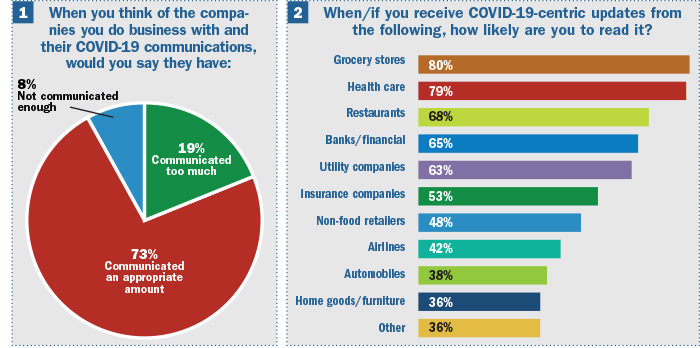
As we move into the third full month of the novel coronavirus, data keeps coming in about the communications from brands and organizations. Some are flooding the zone with messages that are important and useful to recipients. Others simply are adding to the noise, assuring you that the health and safety of their employees is paramount (you hope that’s always been the case, right?). Still others are telling you that they will deliver A, B and C, but when the package or their employees (gloved, masked and distanced) arrive at your home, you find only a fraction of what was promised. That’s a poor example of integration of operations and communications.
In this uncertain time, communicators are wary and are asking questions: Am I communicating too much or too little? Are people reading my communication or tossing it so they can binge the new Netflix series?
Those were some of the questions D.C.-based Clyde Group and Ipsos, the global marketing research firm, asked 1,005 US adults in early April. The data from that survey is shared with PRNEWS exclusively.

In short, the messaging PR pros generated during the first few weeks of the pandemic was well-received, the survey indicates.
Yet much of the country remains undecided about how the private sector’s coronavirus efforts, says Alex Slater, Clyde Group’s founder.
For example, when asked whether corporate America was exceeding expectations around the virus, 48 percent agreed it was, but 34 percent were unsure. “The onus is on companies to win over those ambivalent Americans,” he says.
As chart 1 shows, a significant majority (73 percent) is satisfied with the amount of COVID-19-related-communications “companies they do business with” are sending.
Yet when respondents were asked about companies generally (as opposed to companies they do business with), they were less upbeat. Chart 4 shows 59 percent “strongly believe” or “somewhat agree” that companies’ coronavirus responses are “mainly PR efforts.”

Hate Congress, But...
For Slater, chart 4 is “tremendously troubling,” especially the 21 percent who strongly agree.
He likens it to how voters hate Congress but like their Congress members. As chart 5 shows, 56 percent of respondents reported satisfaction with the communication from companies they do business with; for women, specifically, it was 65 percent.
The takeaway, says Slater, is “simple to advise yet hard to execute; focus on your customers and making your brand relationship stronger. Your stakeholders are craving—and will reward—authenticity, loyalty and empathy.”
There’s also “a giant hidden gender gap” in the perception of corporate America, Slater says. Sixty-five percent of women believe companies are communicating well, versus 46 percent of men. “That’s a massive delta indicating corporate America has a lot of work to do.”
The disparity carries across multiple measures. For example, 63 percent of women found communications from companies “useful,” but just 52 percent of men did. The overall response is in chart 6: a total of 57 percent either “strongly agreed” or “somewhat agreed” that communications from companies about COVID-19 contained “useful information.”

Food and Health Care Top The List
In non-coronavirus times, chart 2 likely looks different. Now, when food, health care, money and insurance are top of mind, communicators in those industries are enjoying a plethora of eyeballs.
Slater agrees Americans are seeking more information, more regularly. But it’s a double-edged sword. “They also expect a higher standard of communication from companies,” Slater says.
And consumers are finicky. Those receiving multiple corporate emails daily were most likely to say companies are exceeding expectations (chart 3). Yet, 64 percent of those who said they get email from multiple companies daily or multiple times daily are likely to agree that those companies’ efforts are PR-driven.
CONTACT: [email protected]
